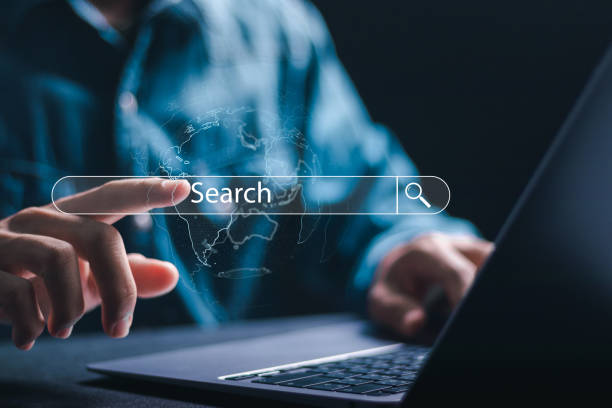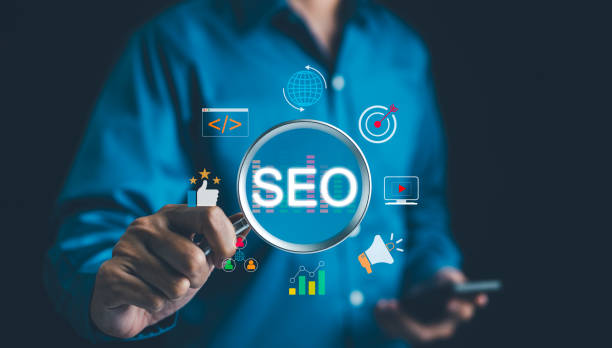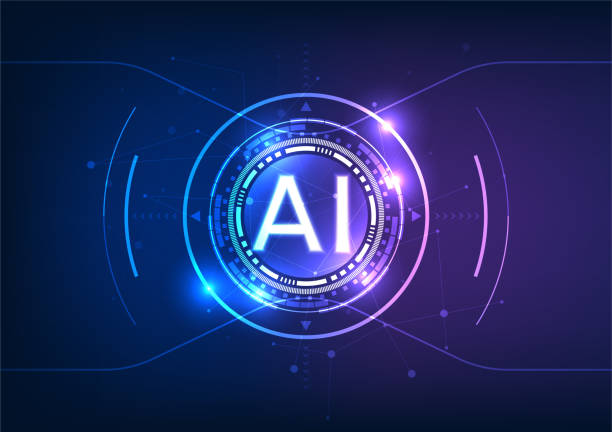Introduction to SEO and its Importance in Today’s World
![]()
In the current digital age, an online presence is vital for every business and individual.
However, simply having a website is not enough; you must ensure your target audience can find your website.
This is where #SEO, or Search Engine Optimization, comes into play.
SEO is a complex and ongoing process that involves improving your website to achieve a higher ranking in search engine results pages (SERPs) like Google.
The main goal of SEO is to increase organic (free) and quality traffic to your website.
This means that users looking for your products or services can easily find you.
SEO-related tutorials help you gain a deeper understanding of search engine algorithms and how they work.
This process is not only technical but also depends on understanding user psychology and their needs.
In fact, the more optimized your website is for search engines, the greater your chances of being seen by your audience and, consequently, increasing sales or engagement.
The concepts of #keyword, #backlink, and #content are the main pillars of any successful SEO strategy.
Does your current website convert visitors into customers or drive them away? Solve this problem forever with professional corporate website design by Rasawp!
✅ Build powerful credibility and branding
✅ Attract target customers and increase sales
⚡ Get a free consultation now!
Keyword Research: The Main Pillar of SEO Strategy

Keyword research is the starting point and one of the most important steps in any successful SEO strategy.
This process involves discovering the words and phrases your target users use in search engines to find information, products, or services similar to yours.
Specialized and accurate keyword research can make a significant difference in the success of your SEO campaign.
This step helps you produce relevant and valuable content that not only meets user needs but is also understandable and rankable for search engines.
Various tools are available for keyword research that can show you search volume, competition level, and related keywords.
Choosing the right keywords means finding a balance between high-volume keywords and less competitive ones to increase your chances of ranking.
Understanding the searcher’s intent behind each keyword is crucial: Is the user looking for information (informational keywords), intending to buy (commercial keywords), or seeking a specific website (navigational keywords)? Answering these questions greatly helps you produce targeted and effective content.
This analytical approach is the foundation of every SEO effort.
On-Page SEO and Website Element Optimization

On-Page SEO refers to all actions you take within your website to improve its ranking in search engines.
This includes optimizing elements such as Title Tag, Meta Description, URL structure, header tags (H1-H6), text content, images, and internal links.
Each of these elements plays a key role in helping search engines understand the page’s topic and its relevance to target keywords.
An engaging title containing the main keyword can increase your click-through rate (CTR) in search results, even if you don’t have the top ranking.
Meta descriptions, although they don’t directly affect ranking, can encourage users to click on your link.
Explanations for image optimization, such as using appropriate alt text, are vital for increasing accessibility and helping search engines understand visual content.
Also, proper use of H1 to H6 tags helps structure content and improve readability for users and search engine crawlers.
This part of SEO is entirely under your control, and by making the right changes, you can achieve significant results.
In addition, a table comparing important on-page SEO elements and their impact on ranking is provided:
| On-Page SEO Element | Description | Impact on SEO |
|---|---|---|
| Page Title (Title Tag) | Blue text in search results | Very Important: Determines page topic |
| Meta Description | Text summary below the title in results | Medium: Increases click-through rate |
| Header Tags (H1-H6) | Content titles and subtitles | Important: Structuring and readability |
| Image Alt Text (Alt Text) | Text description for images | Medium: Accessibility and image understanding |
Technical SEO: The Foundation of Website Optimization

Technical SEO refers to improving the technical aspects of your website so that search engines can easily crawl and index it.
This part of SEO is less about content or links and more about the website’s infrastructure.
Factors such as site loading speed, mobile compatibility, URL structure, Robots.txt file, XML Sitemap, use of SSL certificate (HTTPS), structured data (Schema Markup), and fixing 404 errors or server issues are all part of technical SEO.
A website with fast loading speed provides a better user experience and also receives a positive score from Google.
Today, with the increased use of mobile devices, a website being mobile-friendly is a crucial ranking factor.
Technical issues can prevent your website from being fully crawled by search engines and even prevent important pages from being indexed.
Therefore, performing regular technical audits to identify and fix potential problems is essential.
This section requires specialized knowledge and can significantly impact your overall SEO performance.
This is an ongoing analytical process.
Does your current e-commerce website design lead to losing customers and sales?
Rasawp is your solution with modern and user-friendly e-commerce website designs!
✅ Significantly increase conversion rates and sales
✅ Build strong branding and gain customer trust
⚡ Get a free e-commerce website design consultation from Rasawp now!
Content: The Undisputed King in the World of SEO

“Content is king” is a phrase frequently heard in the world of SEO, and it is entirely true.
The quality and relevance of your website’s content are the most important factors in achieving high rankings in search engines and attracting audiences.
Quality content means text that is comprehensive, useful, accurate, and unique, and answers users’ questions.
This includes various types of content, such as blog articles, product pages, educational guides, videos, infographics, and even podcasts.
For your content to be optimized, target keywords should be naturally integrated into it without overstuffing.
Engaging content can increase user interaction and encourage them to stay longer on the page or share it.
Producing entertaining and engaging content is also an excellent way to capture attention and build a deeper connection with your audience.
Search engines are becoming increasingly intelligent and can determine content quality based on user interaction, time spent on the page, and bounce rate.
Regularly updating existing content can also help maintain rankings and signal freshness of information to search engines.
A strong SEO strategy will be incomplete without a strong content strategy.
Off-Page SEO and the Power of Backlinks

Off-Page SEO refers to all activities you perform outside your website to increase your domain authority and credibility with search engines.
The most important and well-known aspect of Off-Page SEO is backlink building.
Backlinks are links from other websites that point to your website, and in the eyes of search engines, they are considered a vote of confidence in your content.
The greater the number and quality of your backlinks, the more authoritative your website appears, and the higher your chances of ranking in search results.
However, the quality of backlinks is more important than their quantity; a backlink from a reputable, relevant, and high-authority website is much more valuable than dozens of backlinks from spammy or irrelevant sites.
Guidance in this area includes producing valuable content to attract natural links, content marketing, participating in social media networks, and engaging in relevant forums and communities.
In addition to backlinks, social signals, brand mentions, and influencer marketing can also indirectly affect your Off-Page SEO.
An SEO strategy will be incomplete without considering this vital section.
Local SEO and Visibility in a Geographic Area

Local SEO is a specialized branch of SEO aimed at improving the visibility of businesses in local search results.
This type of SEO is especially vital for businesses that offer their services or products in a specific geographic area, such as restaurants, shops, clinics, and salons.
When users search for phrases like “restaurants near me” or “best coffee shop in Isfahan,” Local SEO helps you appear in top results.
Google My Business Profile is a key tool for Local SEO.
Optimizing this profile with accurate information, high-quality images, correct business hours, and responding to customer reviews can significantly impact your local ranking.
Additionally, using local keywords in website content, building links from local websites, and receiving positive reviews and ratings from customers are other important Local SEO tactics.
Continuous news and updates in Google’s algorithms have further highlighted the importance of Local SEO.
This area of SEO is increasingly gaining importance as “near me” searches are on the rise.
This table shows the main differences between general SEO and Local SEO:
| Feature | Global SEO | Local SEO |
|---|---|---|
| Goal | Attract audiences from around the world | Attract customers from a specific geographic area |
| Keywords | General and broad phrases | Phrases containing city/region names |
| Main Factors | Content quality, backlinks, domain authority | Google My Business, local reviews, NAP |
Measuring SEO Success: Key Tools and Metrics

To ensure your SEO efforts are effective, you must be able to measure and analyze your performance.
Without data and metrics, optimizing your website is like navigating in the dark.
Tools like Google Search Console and Google Analytics provide invaluable information about organic traffic, keywords, click-through rate, bounce rate, and user behavior on your website.
Google Search Console helps you identify technical issues with your website and see how Google views your site.
Google Analytics provides precise information about visitors, traffic sources, and most visited pages.
Key Performance Indicators (KPIs) in SEO include keyword rankings, organic traffic, conversion rate, time on page, bounce rate, and the number of backlinks.
Regular analysis of these metrics allows you to identify the strengths and weaknesses of your SEO strategy and make data-driven decisions to improve performance.
This is an ongoing analytical and explanatory approach that aids continuous optimization.
Are you tired of missing business opportunities due to not having a professional corporate website?
Rasawp helps you with professional corporate website design:
✅ Build a powerful and trustworthy image for your brand
✅ Convert website visitors into loyal customers
⚡ Get a free consultation now!
Common SEO Mistakes and Ways to Avoid Them

On the SEO journey, many mistakes can occur that can harm your website’s ranking.
One of the most common mistakes is keyword stuffing, which not only disrupts the user experience but is also recognized as spam by search engines.
Ignoring technical SEO, such as low site speed or lack of mobile compatibility, can lead to significant traffic loss.
Copying content from other websites is also a fatal mistake that can result in penalties from Google.
Building low-quality or spammy backlinks also harms your website instead of helping it.
Not regularly updating content, overlooking searcher intent, and not utilizing Local SEO for physical businesses are other common mistakes.
Guidance to avoid these errors includes focusing on quality over quantity in all aspects of SEO, following Google’s webmaster guidelines, and performing regular SEO audits to identify and resolve issues.
Comprehensive SEO training can help you avoid these common mistakes and pave a smoother path to success.
The Future of SEO and Emerging Trends

The world of SEO is constantly changing and evolving.
What is effective today might not be effective tomorrow.
Future SEO trends include the increasing importance of artificial intelligence and machine learning in search engine algorithms, the growth of voice search, and a greater focus on user experience (UX).
With the advancement of AI, search engines will be able to understand searcher intent and website content more deeply.
This means that instead of solely focusing on keywords, the emphasis should be on providing comprehensive and satisfactory answers to user questions.
Voice search is also on the rise, and SEO for voice search requires a different approach, including focusing on long-tail keywords and conversational language.
User experience will gain increasing importance as a ranking factor; websites with easy navigation, high speed, and responsive design will achieve better rankings.
Additionally, structured data (Schema Markup) will play a more significant role in displaying information in search results.
This is a specialized and evolving field that requires continuous updates.
To succeed in future SEO, you must continuously learn and adapt to these changes.
Frequently Asked Questions
| Question | Answer |
|---|---|
| What is SEO? | SEO, or Search Engine Optimization, is the process of increasing the quality and quantity of website traffic by improving the site’s ranking in organic search engine results like Google. |
| What are the main types of SEO? | SEO is divided into three main categories: On-Page SEO, Off-Page SEO, and Technical SEO. |
| What does On-Page SEO include? | On-Page SEO includes optimizing elements within the website, such as keywords, Title Tags, Meta Descriptions, content, URL structure, images, and internal links. |
| What is Off-Page SEO? | Off-Page SEO refers to activities outside the website that help improve its ranking, such as Backlink Building, social media marketing, and Brand Mentions. |
| What is Technical SEO? | Technical SEO involves optimizing the technical aspects of a website to help search engines crawl and index it better. This includes site speed, mobile-friendliness, site structure, Sitemaps, and Robots.txt files. |
| What role do Keywords play in SEO? | Keywords are phrases that users enter into search engines. Proper and targeted use of relevant keywords in content and site elements helps search engines understand your page’s topic and display it for relevant searches. |
| What is a Backlink and why is it important? | A backlink, or inbound link, is a link from one website to another. Backlinks act as a “vote of confidence” from other sites for search engines and play a significant role in a site’s credibility and ranking, especially if they are from reputable sites. |
| How does quality content impact SEO? | Quality, relevant, comprehensive, and unique content not only attracts and retains users but also shows search engines that your page is valuable. This helps improve ranking, reduce Bounce Rate, and increase user time on site. |
| Why is site loading speed important for SEO? | Site loading speed is an important ranking factor for Google. Faster sites provide a better user experience, have lower bounce rates, and are preferred by search engines. |
| Is SEO a one-time process? | No, SEO is an ongoing and long-term process. Search engine algorithms are constantly changing, competition is increasing, and website content also needs updating. Therefore, SEO requires continuous monitoring, analysis, and optimization. |
And other services of Rasawp Advertising Agency in the field of advertising
Smart Digital Advertising: Professional optimization for SEO ranking improvement using intelligent data analysis.
Smart Website Development: An effective tool for analyzing customer behavior with the help of real data.
Smart Advertising Campaign: An effective tool for online growth with the help of intelligent data analysis.
Smart Brand Identity: A professional solution for campaign management focusing on SEO-driven content strategy.
Smart Conversion Rate Optimization: Professional optimization for online growth using intelligent data analysis.
And over hundreds of other services in the field of internet advertising, advertising consultation, and organizational solutions
Internet Advertising | Advertising Strategy | Advertorial
Sources
Complete Guide to SEO for Online Business Success
Comprehensive SEO Guide for Beginners
SEO Training: Step-by-Step SEO Guide
Comprehensive SEO Guide
Are you looking for a digital transformation for your business? Rasawp Afarin Digital Marketing Agency paves the way for your growth by offering services such as professional website design, SEO, and social media management. Trust us to make your online presence shine and elevate your business to peak success.
📍 Tehran, Mirdamad Street, next to Bank Markazi, Kazerun Jonoubi Alley, Ramin Alley No. 6



